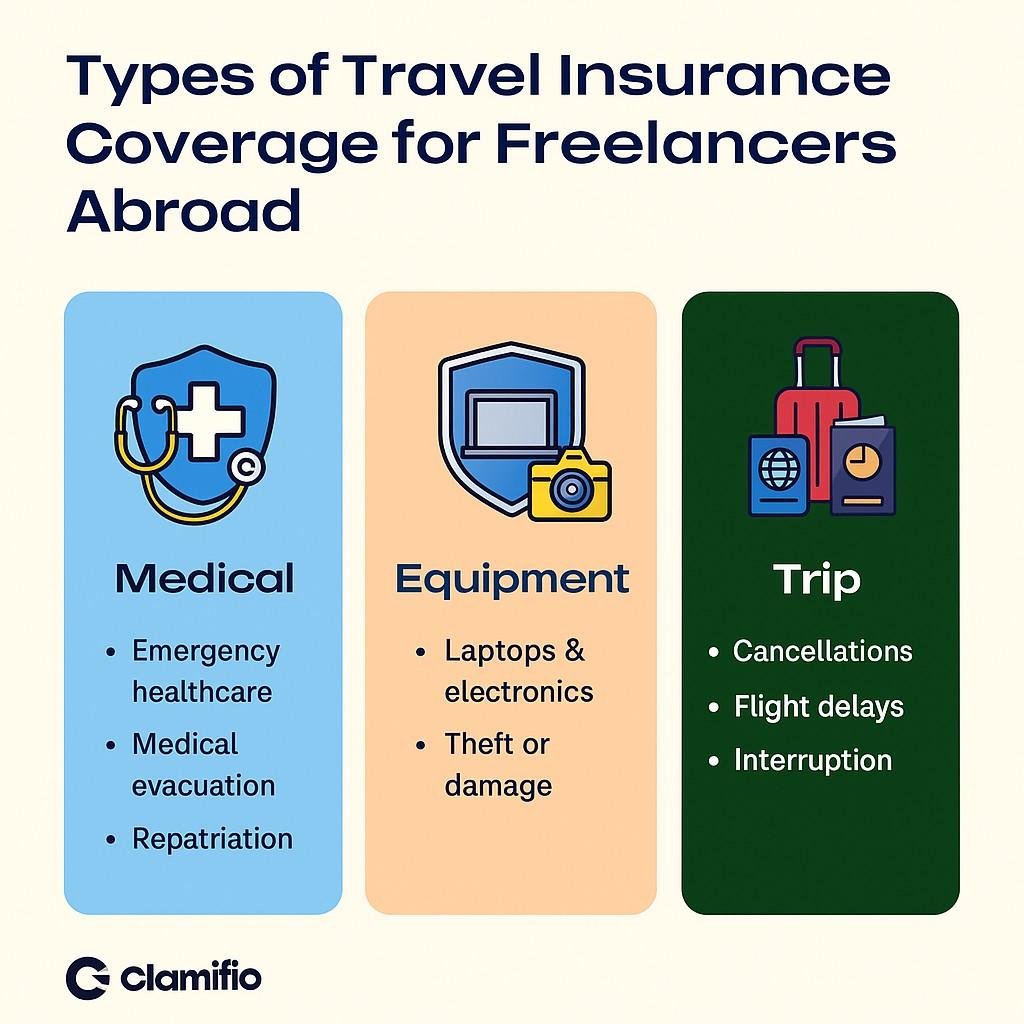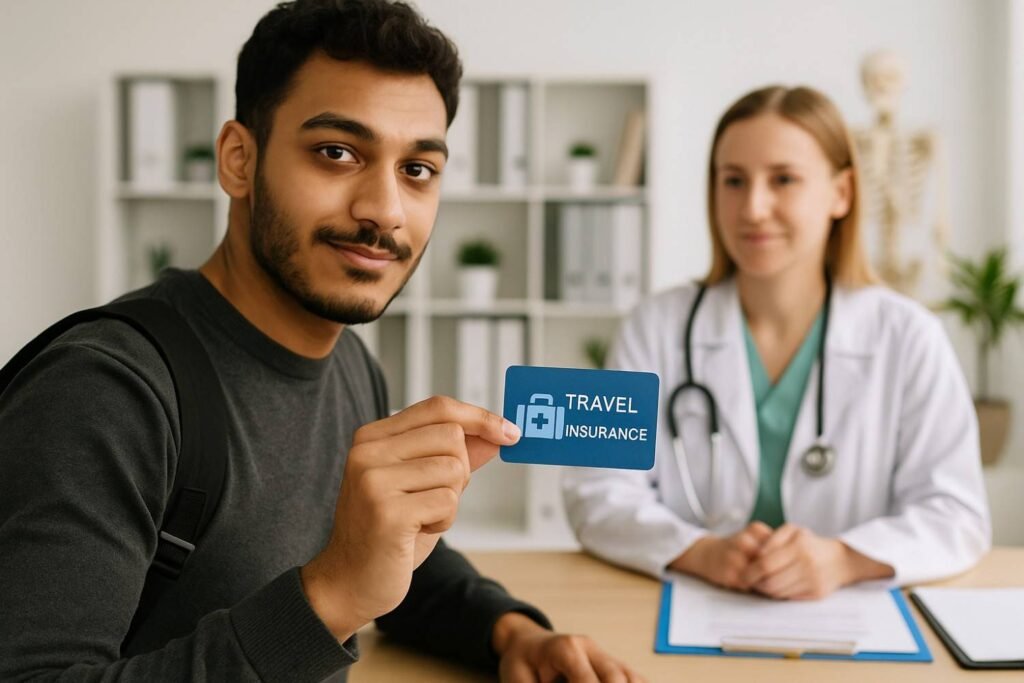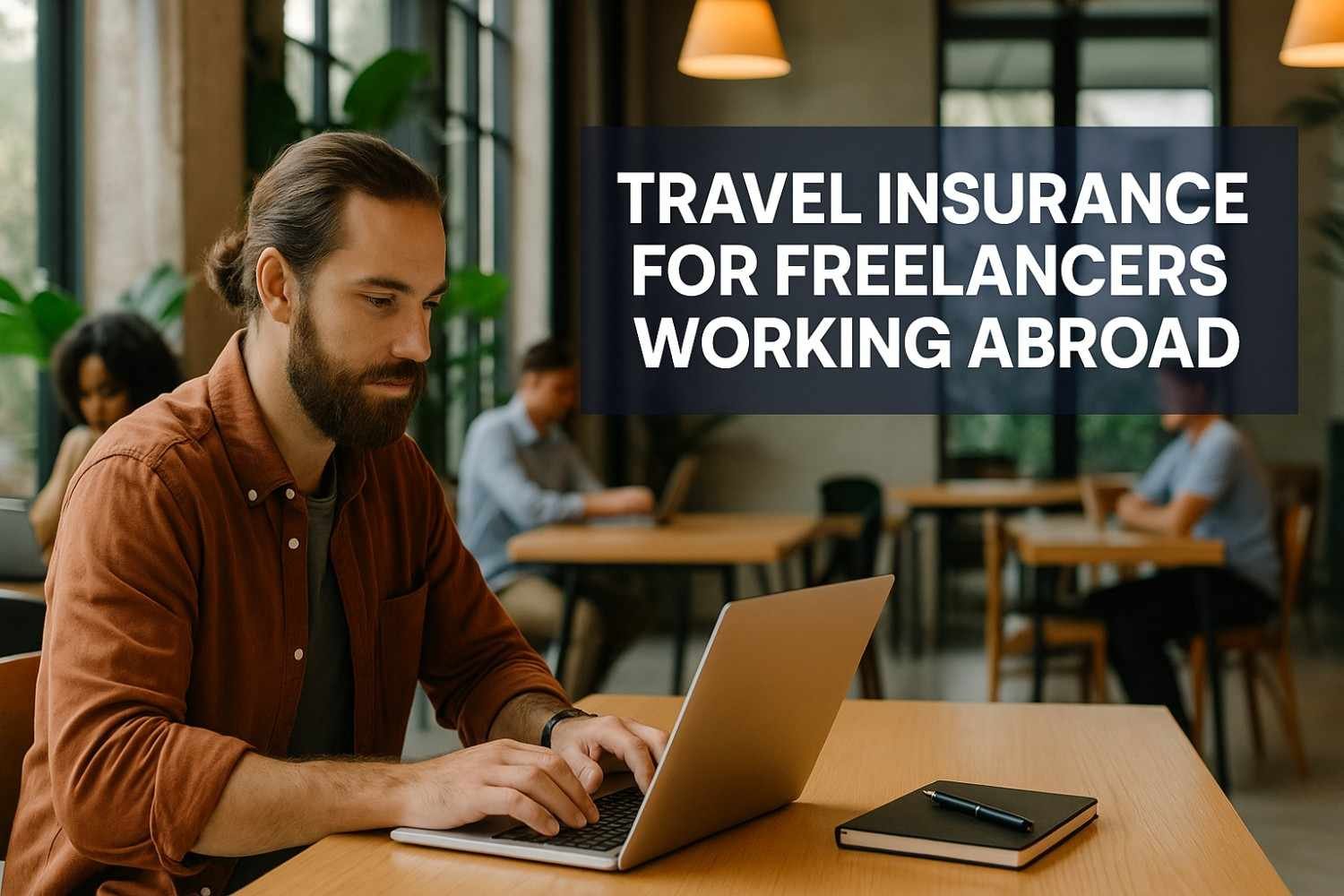Introduction
Freelancing is no longer tied to a desk or a single country. With the rise of digital nomads, many freelancers work from coffee shops in Lisbon, beachfront co-working spaces in Bali, or apartments in Berlin. The flexibility is exciting—but it comes with real risks.
What if your laptop is stolen? What if you end up in a hospital abroad with no health coverage? What if a storm cancels your flight or forces you to leave early?
That’s where travel insurance for freelancers working abroad becomes more than just a backup plan—it’s a lifeline.
In this comprehensive guide, we’ll explain what travel insurance covers, why freelancers need it, how to choose the right policy, what it costs, and the best options in 2025.
Why Freelancers Need Travel Insurance Abroad
Unlike tourists who take short trips, freelancers often stay abroad for weeks or months while working. This lifestyle brings unique challenges:
1. Medical Emergencies
- Without insurance, a simple ER visit abroad can cost thousands.
- Countries like Thailand, Spain, or Canada may require proof of health coverage for long-term visas.
2. Loss or Theft of Equipment
- A freelancer’s laptop isn’t just personal—it’s their income source.
- Travel insurance can help cover stolen or damaged devices.
3. Trip Interruptions
- Illness, natural disasters, or political unrest may force you to cancel bookings.
- Insurance covers unused flights, hotels, and bookings.
4. Visa & Residency Requirements
- Many countries now require travel or health insurance before issuing work permits or digital nomad visas.
5. Peace of Mind
- Instead of worrying about “what if,” you can focus on productivity and travel.

Types of Travel Insurance Coverage for Freelancers
Freelancers need more than the typical “tourist” coverage. Here are the essentials:
1. Medical & Health Coverage
- Covers hospitalization, doctor visits, emergency evacuation.
- Some plans include COVID-19 coverage.
👉 Essential for freelancers in regions with high medical costs (like the U.S. or Japan).
2. Equipment & Gadget Coverage
- Protects laptops, cameras, phones from theft, loss, or damage.
👉 Especially valuable for freelance designers, photographers, or writers.
3. Trip Cancellation/Interruption
- Refunds prepaid travel costs if you must cancel due to illness, weather, or emergencies.
4. Liability Insurance
- Covers accidental damage to others (e.g., breaking property in a rented co-working space).
5. Long-Term Digital Nomad Insurance
- Some providers now bundle health, travel, and equipment coverage into one plan.
👉 Perfect for freelancers abroad for 6+ months.

Step-by-Step: How to Choose the Right Travel Insurance
1. Assess Your Needs
- Short trips vs. long stays?
- How valuable is your equipment?
- Do you need multi-country coverage?
2. Compare Coverage Limits
- Medical coverage should be at least $100,000 USD.
- Equipment coverage should match the value of your laptop/gear.
3. Check Exclusions
- Some plans exclude adventure sports, pre-existing conditions, or high-value electronics.
4. Review Visa Requirements
- Example: Schengen visas require at least €30,000 medical coverage.
5. Look at Claims Process
- Can claims be filed online?
- Does the provider offer 24/7 emergency assistance?
6. Balance Cost vs. Benefits
- Average cost: $40–$100/month.
- Long-term policies are cheaper than multiple short-term ones.
Best Travel Insurance Providers for Freelancers (2025)
1. SafetyWing Nomad Insurance
- Affordable ($45/month avg.).
- Covers 180+ countries.
- Flexible subscription, cancel anytime.
👉 Best for digital nomads on a budget.
2. World Nomads
- Designed for creatives and freelancers.
- Covers high-value equipment like cameras/laptops.
- Great for multi-country travel.
👉 Best for creative freelancers.
3. Allianz Global Assistance
- Strong medical + emergency evacuation coverage.
- Trusted worldwide.
👉 Best for comprehensive medical protection.
4. IMG Global Medical Insurance
- Offers long-term health + travel coverage.
- Ideal for freelancers relocating abroad.
👉 Best for expats and long-term workers.
5. AXA Schengen Insurance
- Complies with Schengen visa rules.
- Strong EU coverage.
👉 Best for freelancers in Europe.
FAQs: Travel Insurance for Freelancers
Q1. How much does travel insurance for freelancers cost?
Between $40–$100/month depending on provider, coverage, and country.
Q2. Can I get travel insurance after I leave my home country?
Yes. Providers like SafetyWing and World Nomads allow sign-ups abroad.
Q3. Does insurance cover freelance income loss?
No, but it covers stolen equipment, medical bills, and trip cancellations.
Q4. Is my laptop covered?
Yes—if you choose a policy with gadget coverage. Some plans have value limits.
Q5. Do I need both travel and health insurance?
Yes. Travel covers emergencies; health covers routine care if you stay abroad long-term.
Q6. What countries require insurance for freelancers?
Schengen (EU), Thailand, UAE, and many digital nomad visa programs.
Q7. Are pre-existing conditions covered?
Usually not—unless you buy a specialized health plan.
Q8. Which is better: annual or monthly coverage?
Annual is cheaper if you’ll be abroad all year.
Q9. Can I choose any doctor abroad?
Most insurers have global networks, but you can often choose your own.
Q10. Is digital nomad insurance worth it?
Yes—bundled packages save money and cover what freelancers actually need.

Conclusion
Working abroad as a freelancer opens doors to freedom and adventure—but it also exposes you to risks that could wipe out savings or disrupt your career.
That’s why travel insurance for freelancers working abroad isn’t just optional—it’s essential. With the right plan, you’re covered for medical emergencies, equipment theft, trip cancellations, and liability issues, no matter where you are in the world.
Whether you’re a graphic designer in Bali, a writer in Spain, or a developer in Thailand, investing in proper coverage ensures you can work confidently and travel stress-free.
Disclaimer
This article is for informational purposes only. Clamifio does not provide or sell insurance products. Always consult an insurance provider or licensed advisor before purchasing coverage.

